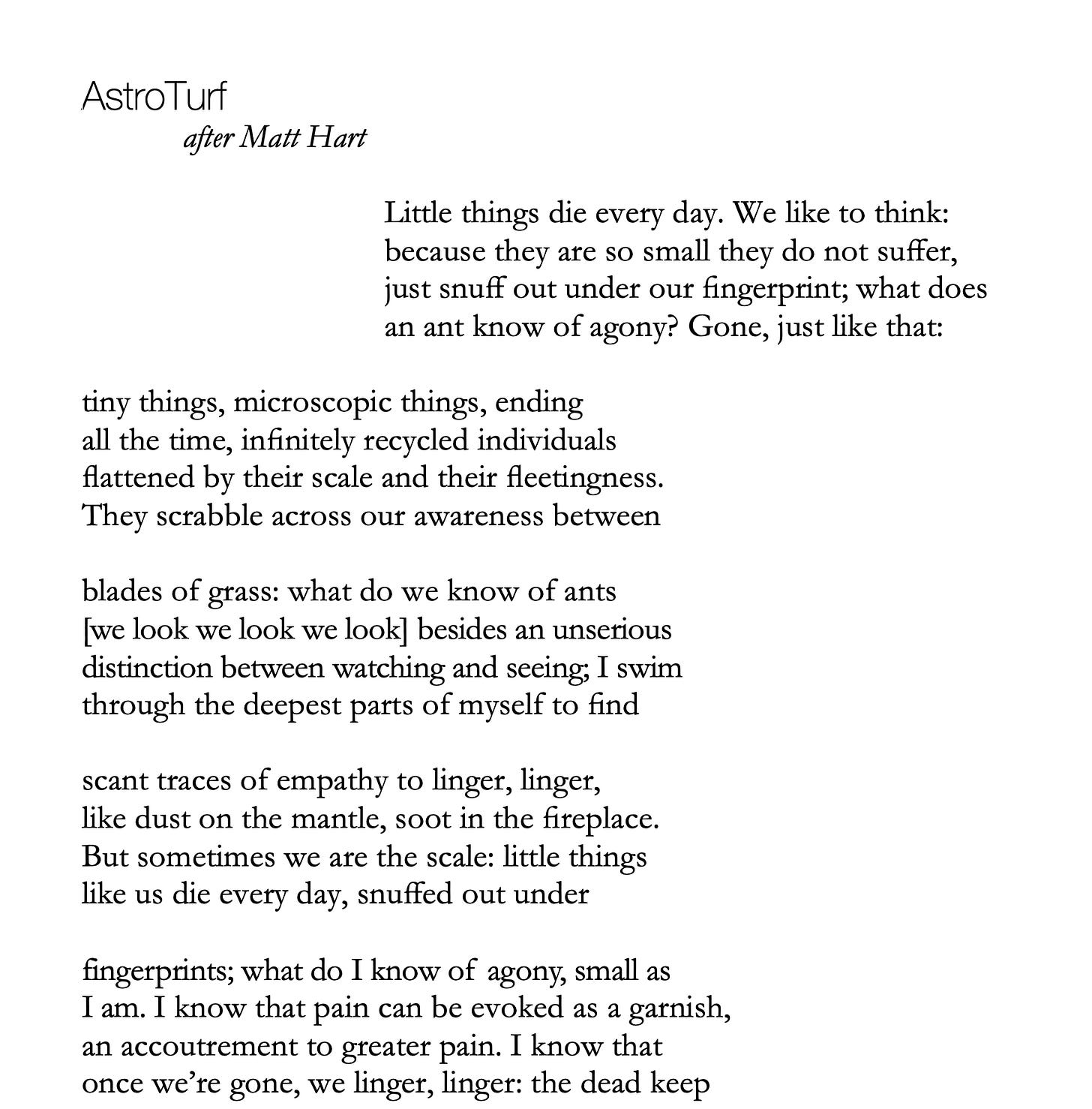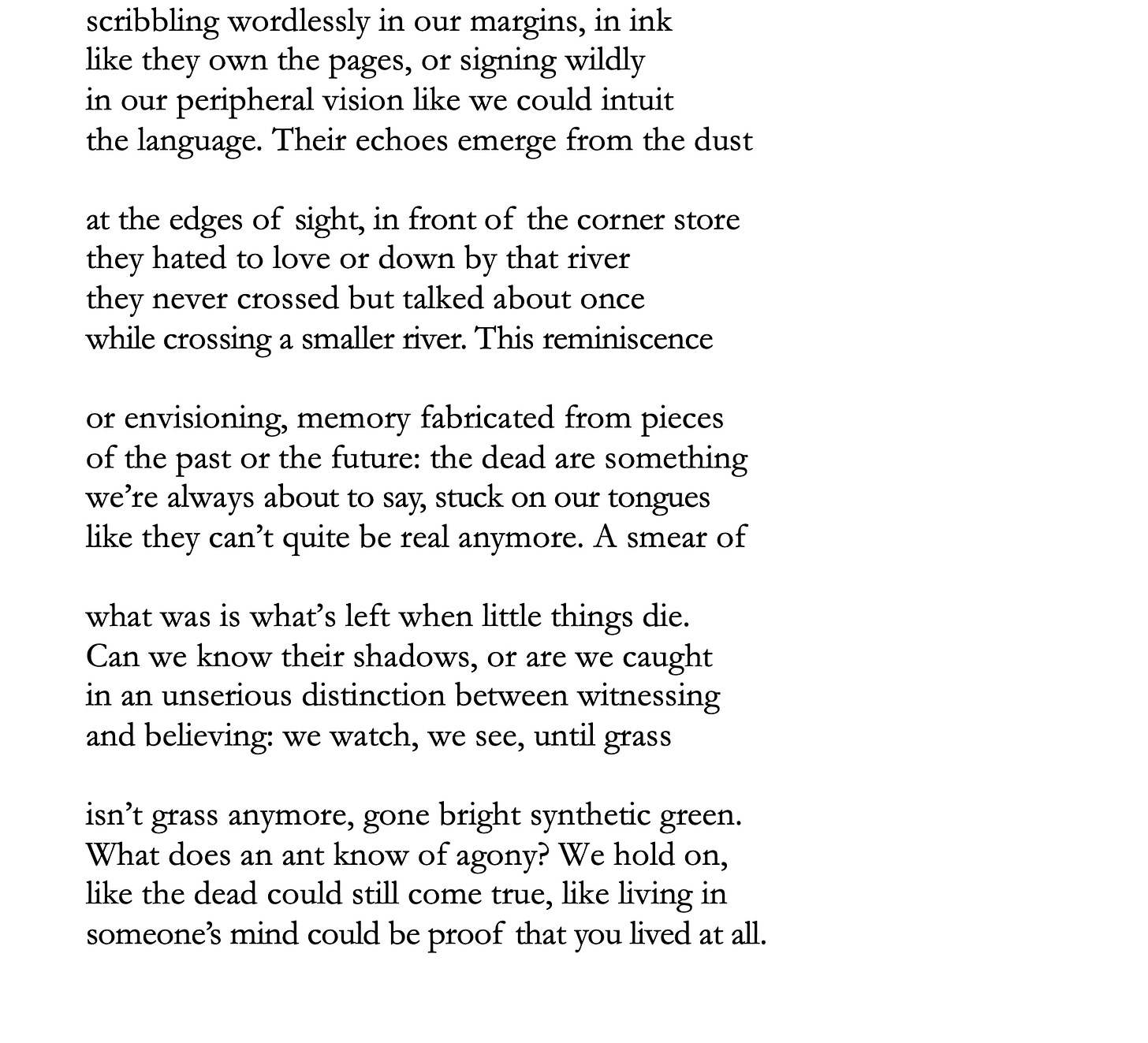AstroTurf
Community matters a lot in the world of poetry. There’s of course the concrete community made up of friends and peers, the people you’re in direct communication with, always reading each other’s work and going to each other’s readings. But on top of that you have a more ephemeral community composed of the whole tree of influence that surrounds you, people you’ve read and who’ve read you, from acolytes to idols. This matters because, as people say, when done right poetry is a conversation, and every good poet I know develops their poetics by bouncing off of the words and ideas that exist within their poetry communities.
Yet poems, like most writing, are still generally understood as solitary acts, as something one person does in the privacy of their own Microsoft Word documents.
Every so often, some people push back against that siloing and try to interject collaboration into the practice of poetry. Right now, two such people are Danika Stegeman and Jace Brittain, who host the It’s Copperhead Seasons collaborative reading series, approaching its fourth iteration next month. Danika and Jace don’t come in any set expectations expectations of what “collaboration” should look like, only that the two poets they choose to work together, well, work together.
I was lucky enough to be featured for the third It’s Copperhead Season, which you can see here on YouTube. My collaborator was (electric and eclectic) poet Matt Hart out of Cincinnati, who I didn’t know from Adam before I was paired with him. Despite coming in as strangers, did we ever work together.
Over the course of the three months leading up to the reading, Matt and I shared a Google Doc, a lot of previously written poems, and about five thousand new words, taking each other’s old work and deconstructing it, reimagining it, or, as Matt calls it, “obliterating” it. Our process was pretty simple: after each obliteration, the original poet would then re-obliterate the obliteration, and then, if there was time and inclination, the other poet could re-obliterate that re-obliteration, and so on.
This wasn’t just writing a series of “after” poems, but rather consciously working together to build something together, a web of connections, a conversation. It turned out pretty damn cool, as you can see in the video above. While the reading itself was a discrete goal that we completed, Matt and I have talked about continuing to collaborate because the process was so fruitful, spending our time investing in the un-individualization of the poetic act. Today’s poem came from that continuing investment, written a few days ago, obliterating Matt’s poem of the same name. It’s about death and the dead, but I don’t think it’s a sad song.
Oh! And if you’re a poet who’s interested in collaboration, definitely definitely consider signing up for the It’s Copperhead Season reading series here!
Okay, that’s all for today. I hope you enjoy the poem.
AstroTurf after Matt Hart Little things die every day. We like to think: because they are so small they do not suffer, just snuff out under our fingerprint; what does an ant know of agony? Gone, just like that: tiny things, microscopic things, ending all the time, infinitely recycled individuals flattened by their scale and their fleetingness. They scrabble across our awareness between blades of grass: what do we know of ants [we look we look we look] besides an unserious distinction between watching and seeing; I swim through the deepest parts of myself to find scant traces of empathy to linger, linger, like dust on the mantle, soot in the fireplace. But sometimes we are the scale: little things like us die every day, snuffed out under fingerprints; what do I know of agony, small as I am. I know that pain can be evoked as a garnish, an accoutrement to greater pain. I know that once we’re gone, we linger, linger: the dead keep scribbling wordlessly in our margins, in ink like they own the pages, or signing wildly in our peripheral vision like we could intuit the language. Their echoes emerge from the dust at the edges of sight, in front of the corner store they hated to love or down by that river they never crossed but talked about once while crossing a smaller river. This reminiscence or envisioning, memory fabricated from pieces of the past or the future: the dead are something we’re always about to say, stuck on our tongues like they can’t quite be real anymore. A smear of what was is what’s left when little things die. Can we know their shadows, or are we caught in an unserious distinction between witnessing and believing: we watch, we see, until grass isn’t grass anymore, gone bright synthetic green. What does an ant know of agony? We hold on, like the dead could still come true, like living in someone’s mind could be proof that you lived at all.



